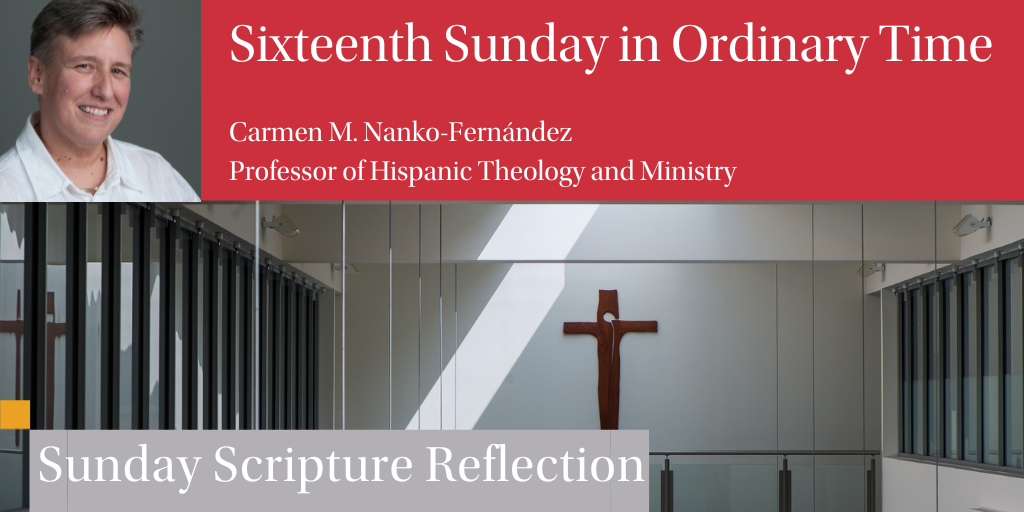
Readings:
Jer 23:1-6
Ps 23:1-3, 3-4, 5, 6
Eph 2:13-18
Mk 6:30-34
Twenty years ago, an escaped Merino sheep who had evaded the shearers for six years, was found hiding in caves in South Island, New Zealand. Shrek the Sheep became a national celebrity and a global headline with the televised shearing of his approximately sixty-pound fleece. In his lifetime he would go on to meet the Prime Minister, bring $100 million to the New Zealand economy, raise tens of thousands of dollars for the Cure Kids Charity, educate children through school trips and books written about his adventures, and bring comfort through his visits to patients in hospitals and elders in nursing homes. Upon his death in 2011, the director of the charity that had benefited from his fame commented, “At the end of the day, it is the death of an iconic Kiwi. He just happens to be a sheep.” According to local reports, a memorial service for Shrek the Sheep was held at the Church of the Good Shepherd.
For six out of his almost 17-year life this sheep, temporarily without a shepherd, managed to survive. The lectionary readings for this Sunday turn our attention to a favored motif throughout the Bible, the relationship between shepherds and their flocks. In Jeremiah, shepherd are metaphors for leaders and the prophet warns of the perils of exploitative leadership and the judgment that will befall those who abuse their positions and power. Psalm 23 finds in the shepherd a soothing image of God who ensures the protection and fulfillment of those who entrust their lives to divine care. In the gospel of Mark, Jesus pities the crowds that follow him and his disciples, like sheep without a shepherd. Though considering the adventures of Shrek the Sheep one really must wonder if Jesus’ concerns are entirely warranted.
In all three biblical scenarios, the dependence and vulnerability of the sheep are exposed and the qualities of good shepherding revealed. Jeremiah’s sheep are trembling and fearful, susceptible to being dispersed and misled. The anxiety of the sheep in the psalm is alleviated by the ever-present company of the shepherd with a sense for locating environments free of stress, want, and fear. In the gospel, Jesus steps into the breach and nurtures those in search of a shepherd with life-sustaining teaching and a meal. The verses that follow today’s gospel reading tell of the feeding of the five thousand.
Sheep may be classified as prey, but they are also providers. It is not in a shepherd’s best interests to endanger sheep singularly or collectively. Whether a shepherd is a hired hand or owner, caring for sheep is an investment. Sheep are sources of income; their bodies provide humans with sustenance in multiple ways. A 2019 forum in the interdisciplinary journal Animal Sentience explored in depth the complexity of sheep and the “historical perceptions of sheep that fuel and sustain contemporary media, popular culture, and farming practices.” The conversation underscored the social orientation of sheep and their capacities for learning, cognition, emotion, and personality. They challenged the commodification of sheep. The authors of the lead article also observed that “Christian and other theologies situate sheep in the contemporary consciousness as obedient, passive, and uniform; this view has negative consequences for sheep.”
That view has negative consequences for humans as well! When interpreting metaphors that involve sheep and shepherds, it is too often our tendency to focus on the shepherds when in reality the majority of us are the sheep. Consider the consequences on understandings of what it meant to be Church. For example, in a 1906 encyclical Pope Pius X described the Church as
“essentially an unequal society, that is, a society comprising two categories of persons, the Pastors and the flock, those who occupy a rank in the different degrees of the hierarchy and the multitude of the faithful…. the one duty of the multitude is to allow themselves to be led, and, like a docile flock, to follow the Pastors.”
In pondering the concern of Jesus for the crowd, that “they were like sheep without a shepherd,” I am reminded of “Sheep Haiku” by one of my favorite poets, and fellow New Yorker, Martín Espada.
A lone sheep cries out:
There are more of us than them!
The flock keeps grazing.
What if Jesus’ concern is that of a sheep for his own? What if the teaching he shares is a warning that not all shepherds have integrity “woe to you shepherds”? Beware of false shepherds, of pastoral and political leaders who see you as a commodity to be exploited and manipulated. What if we were to remember that in the New Testament Jesus is portrayed both as a good shepherd and a lamb of God?
Carmen M. Nanko-Fernández
Professor of Hispanic Theology and Ministry
Sources:
